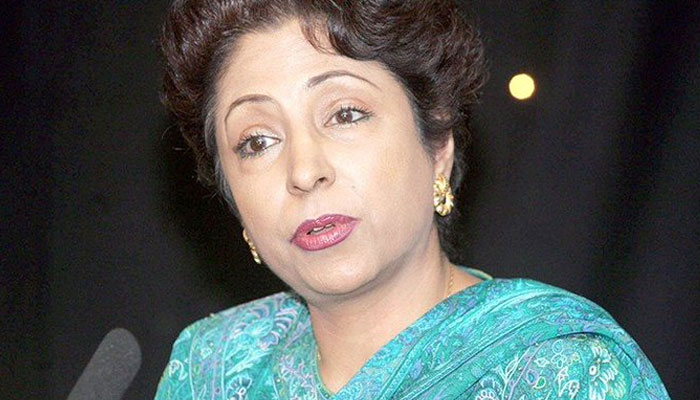Soft power of arts, culture and governance style helps create goodwill for countries: Maleeha Lodhi
Literature, arts, culture and style of governance form the soft power of any country that helps create goodwill for that country among other nations. This soft power is often more effective than countries’ hard power, which is a measure of their economic and military strength when it comes to achieving diplomatic targets.
Former representative of Pakistan to the United Nations (UN) Maleeha Lodhi, who also served as the Pakistani ambassador to the United States, said this at the inauguration of the Adab Festival 2020 at the Arts Council of Pakistan on Friday. The festival, which has been organised by Ameena Saiyid and Asif Farrukhi in collaboration with the Arts Council, will conclude on Sunday, February 2.
The term ‘soft power’ was coined by political scientist Joseph Nye, Lodhi said. She explained that there were many countries with little military power and they might be not very strong in terms of economic indicators, but due to their culture, heritage, arts, humanitarian activities and progressive values, they enjoyed great respect in the global community.
She remarked that due to the fast pace of developments in the world nowadays, no country could afford acting slowly to achieve diplomatic targets. She said there were no permanent allies for the countries and it was possible that for one set of targets, a country had allied itself with one set of countries, and at the same time, it was in the bloc of other countries to achieve another goal.
Explaining how soft power could have an enormous impact, Lodhi recalled the recent election of Pakistan to the UN Human Rights Council. She said there was a tough competition in the elections, but Pakistan managed to get elected and one of the reasons behind its victory was a concert of Rahat Fateh Ali Khan that she had organised at the UN, which generated a lot of goodwill for the country.
She said that of 193 countries in the UN, more than 50 countries were of Africa. Similarly, there were many countries that were islands.
According to Lodhi, Pakistan does not even have its diplomatic missions in those countries and the only way it could gather their support in such elections was due to soft power that it derived from culture and arts.
The former Pakistani representative to the UN stressed the need for promoting the culture, arts and heritage of Pakistan. She added that the bureaucrats of Islamabad needed to explore other areas of Pakistan and events happening in the country like the Adab Festival to get the feel of our country, which had a potential of exercising huge soft power.
Other keynote speakers at the event were former chief justice of Pakistan Asif Saeed Khosa and British expert Dr Francis Robinson.
Dr Robinson started his speech with the history of Karachi, summarising various phases in the development of the city since the Muslim invasion of Sindh by Muhammad Bin Qasim. He said that as the city became the capital of Pakistan after Partition, it gained prominence and many people who migrated from India to Pakistan chose the city as their new hometown despite the fact that it was located in an arid zone.
Later, the British scholar commented on English literature produced by Pakistanis. He termed the present times ‘the golden age of Pakistani writing in English’. He mentioned Nadeem Aslam’s ‘Season of the Rainbirds, Muhammed Hanif’s ‘A Case of Exploding Mangoes’, Mohsin Hamid’s ‘Reluctant Fundamentalist’ and Kamila Shamsie’s ‘Home Fire’ as some of outstanding works of English fiction by Pakistani writers. He also discussed the trend of increasing translations of South Asian writings into English.
-
 Caleb McLaughlin Shares His Resume For This Major Role
Caleb McLaughlin Shares His Resume For This Major Role -
 King Charles Carries With ‘dignity’ As Andrew Lets Down
King Charles Carries With ‘dignity’ As Andrew Lets Down -
 Brooklyn Beckham Covers Up More Tattoos Linked To His Family Amid Rift
Brooklyn Beckham Covers Up More Tattoos Linked To His Family Amid Rift -
 Shamed Andrew Agreed To ‘go Quietly’ If King Protects Daughters
Shamed Andrew Agreed To ‘go Quietly’ If King Protects Daughters -
 Candace Cameron Bure Says She’s Supporting Lori Loughlin After Separation From Mossimo Giannulli
Candace Cameron Bure Says She’s Supporting Lori Loughlin After Separation From Mossimo Giannulli -
 Princess Beatrice, Eugenie Are ‘not Innocent’ In Epstein Drama
Princess Beatrice, Eugenie Are ‘not Innocent’ In Epstein Drama -
 Reese Witherspoon Goes 'boss' Mode On 'Legally Blonde' Prequel
Reese Witherspoon Goes 'boss' Mode On 'Legally Blonde' Prequel -
 Chris Hemsworth And Elsa Pataky Open Up About Raising Their Three Children In Australia
Chris Hemsworth And Elsa Pataky Open Up About Raising Their Three Children In Australia -
 Record Set Straight On King Charles’ Reason For Financially Supporting Andrew And Not Harry
Record Set Straight On King Charles’ Reason For Financially Supporting Andrew And Not Harry -
 Michael Douglas Breaks Silence On Jack Nicholson's Constant Teasing
Michael Douglas Breaks Silence On Jack Nicholson's Constant Teasing -
 How Prince Edward Was ‘bullied’ By Brother Andrew Mountbatten Windsor
How Prince Edward Was ‘bullied’ By Brother Andrew Mountbatten Windsor -
 'Kryptonite' Singer Brad Arnold Loses Battle With Cancer
'Kryptonite' Singer Brad Arnold Loses Battle With Cancer -
 Gabourey Sidibe Gets Candid About Balancing Motherhood And Career
Gabourey Sidibe Gets Candid About Balancing Motherhood And Career -
 Katherine Schwarzenegger Shares Sweet Detail From Early Romance Days With Chris Pratt
Katherine Schwarzenegger Shares Sweet Detail From Early Romance Days With Chris Pratt -
 Jennifer Hudson Gets Candid About Kelly Clarkson Calling It Day From Her Show
Jennifer Hudson Gets Candid About Kelly Clarkson Calling It Day From Her Show -
 Princess Diana, Sarah Ferguson Intense Rivalry Laid Bare
Princess Diana, Sarah Ferguson Intense Rivalry Laid Bare




